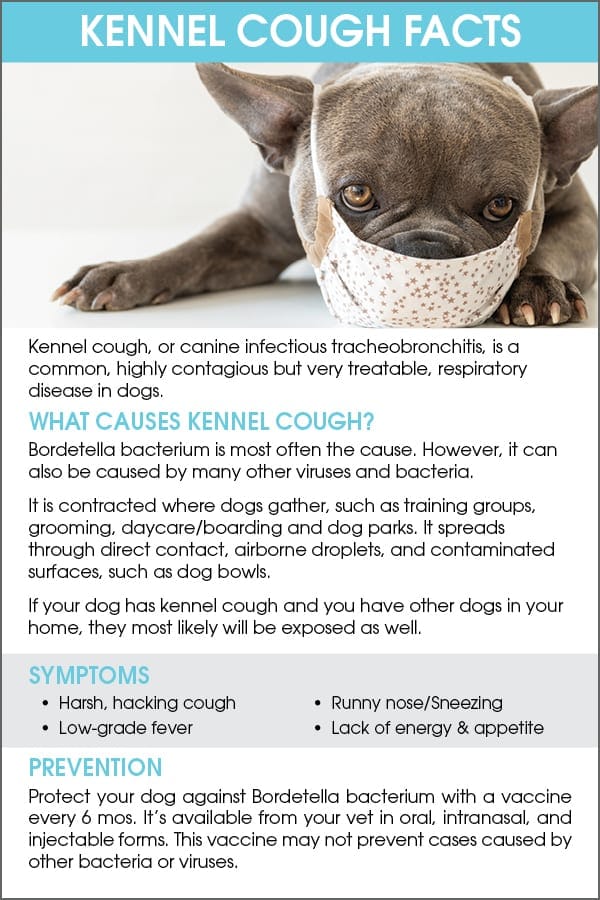Kennel cough, also known as canine infectious respiratory disease (CIRD), is a prevalent and highly contagious respiratory infection in dogs. It commonly affects dogs that have recently been in environments with other dogs, such as boarding facilities, doggy daycare centers, or grooming salons. While not a medical emergency in most cases, understanding its symptoms, causes, and how to prevent it is crucial for every dog owner. The hallmark symptom of kennel cough is a distinctive honking cough, which can linger for several days or even weeks. Fortunately, most cases resolve with supportive care, and it is not contagious to humans.
What is Kennel Cough?
Kennel cough is a condition characterized by inflammation of a dog’s upper respiratory tract. This inflammation often leads to a dry, hacking cough. While it’s typically not severe, it can be uncomfortable for the dog and concerning for owners. Many cases of kennel cough in dogs can resolve without the need for specific veterinary intervention, relying instead on rest and supportive measures.
Symptoms of Kennel Cough in Dogs
The most prominent symptom of kennel cough is a sudden onset of a harsh, “honking” cough. This cough can sound quite alarming, sometimes leading owners to believe their dog is choking or has something lodged in its throat. Other potential symptoms include:
- A runny nose.
- Watery eyes.
- Lethargy or decreased energy levels.
- Loss of appetite in some cases.
It is important to note that while a cough is the primary indicator, other symptoms may accompany it, and their severity can vary widely among affected dogs.
Causes of Kennel Cough in Dogs
Kennel cough is not caused by a single pathogen but rather a complex of viruses and bacteria that can infect a dog’s respiratory system, often simultaneously. Some of the key culprits include:
- Viruses: Canine respiratory coronavirus, canine adenovirus type 2, canine parainfluenza virus, and canine distemper virus.
- Bacteria: Bordetella bronchiseptica is a significant bacterial contributor.
These infectious agents are transmitted through airborne droplets when an infected dog coughs, sneezes, or barks. Contaminated objects like food and water bowls, shared toys, or even the hands of people who have petted an infected dog can also facilitate the spread. Dogs of any age, breed, or gender are susceptible. However, brachycephalic breeds (those with short muzzles) such as English Bulldogs, French Bulldogs, and Pugs may experience more severe symptoms due to their naturally compromised airways. Frequenting environments where multiple dogs congregate significantly increases a dog’s risk of exposure.
Diagnosing Kennel Cough
Veterinarians typically diagnose kennel cough based on a dog’s medical history and a physical examination, focusing on the characteristic cough. If your dog is coughing at home, providing a video recording to your vet can be helpful, as the cough may not always manifest during the clinic visit. Your vet will also inquire about any lethargy or changes in appetite. To rule out other respiratory issues, chest X-rays may be recommended to assess the condition of your dog’s lungs. In some instances, a nasal swab might be taken for PCR testing or culture to pinpoint the specific causative agent.
Treatment for Kennel Cough
In many cases, treatment for kennel cough is largely supportive. Your veterinarian might prescribe cough suppressants to help your dog rest more comfortably, especially at night. For dogs showing signs of a bacterial infection, such as greenish nasal discharge, lethargy, or a poor appetite, antibiotics like doxycycline may be prescribed. However, additional treatment is often not necessary, and the condition typically resolves within 10 to 14 days with adequate rest.
Recovery and Management
Most dogs make a full recovery from kennel cough within one to two weeks. It is crucial to keep your dog isolated from other dogs for at least two weeks after their coughing subsides to prevent further spread. Puppies and senior dogs, due to their less robust immune systems, are at a higher risk of complications and warrant closer monitoring. Supportive care is paramount during recovery. Ensure your dog maintains good food and water intake; sometimes, enticing them with their favorite foods can help stimulate their appetite. Probiotics, such as Purina FortiFlora or Nutramax Proviable, can support gut health and bolster the immune system. Administering steam therapy by having your dog in the bathroom during your shower can help to keep their airways moist and ease irritation.
Preventing Kennel Cough
Prevention is key to protecting your dog from kennel cough. The Bordetella vaccine is available and protects against Bordetella bronchiseptica, a common cause of the illness. While this vaccine can reduce the risk, it does not guarantee complete protection against all potential pathogens. The most effective way to prevent kennel cough is to minimize your dog’s exposure to infected dogs. This means being cautious about visiting places where numerous dogs are housed together. If your dog frequently uses doggy daycares and boarding facilities, ensure the facility has strict vaccination policies and good hygiene practices. Considering an in-home pet-sitting service can also be a safer alternative.
Frequently Asked Questions About Kennel Cough
How is kennel cough treated in dogs?
Treatment typically involves supportive care, such as cough suppressants, and sometimes antibiotics if a bacterial infection is present.
Can kennel cough resolve on its own?
Yes, kennel cough often resolves naturally within 10 to 14 days with rest.
What are the initial signs of kennel cough?
The most common initial sign is a distinctive honking cough.
Is kennel cough transmissible to humans?
No, kennel cough is not contagious to humans.
When should I take my dog to the vet for kennel cough?
Consult your veterinarian if your dog shows severe signs like extreme lethargy, difficulty breathing, colored nasal discharge, or a productive cough. Senior dogs and puppies exhibiting any symptoms should also be seen by a vet promptly due to their increased risk of complications.

